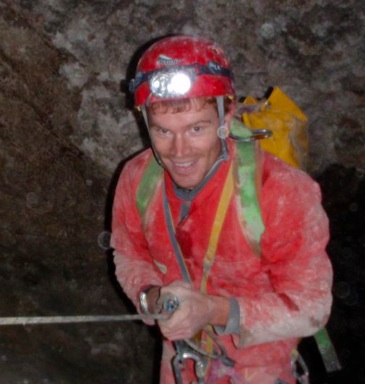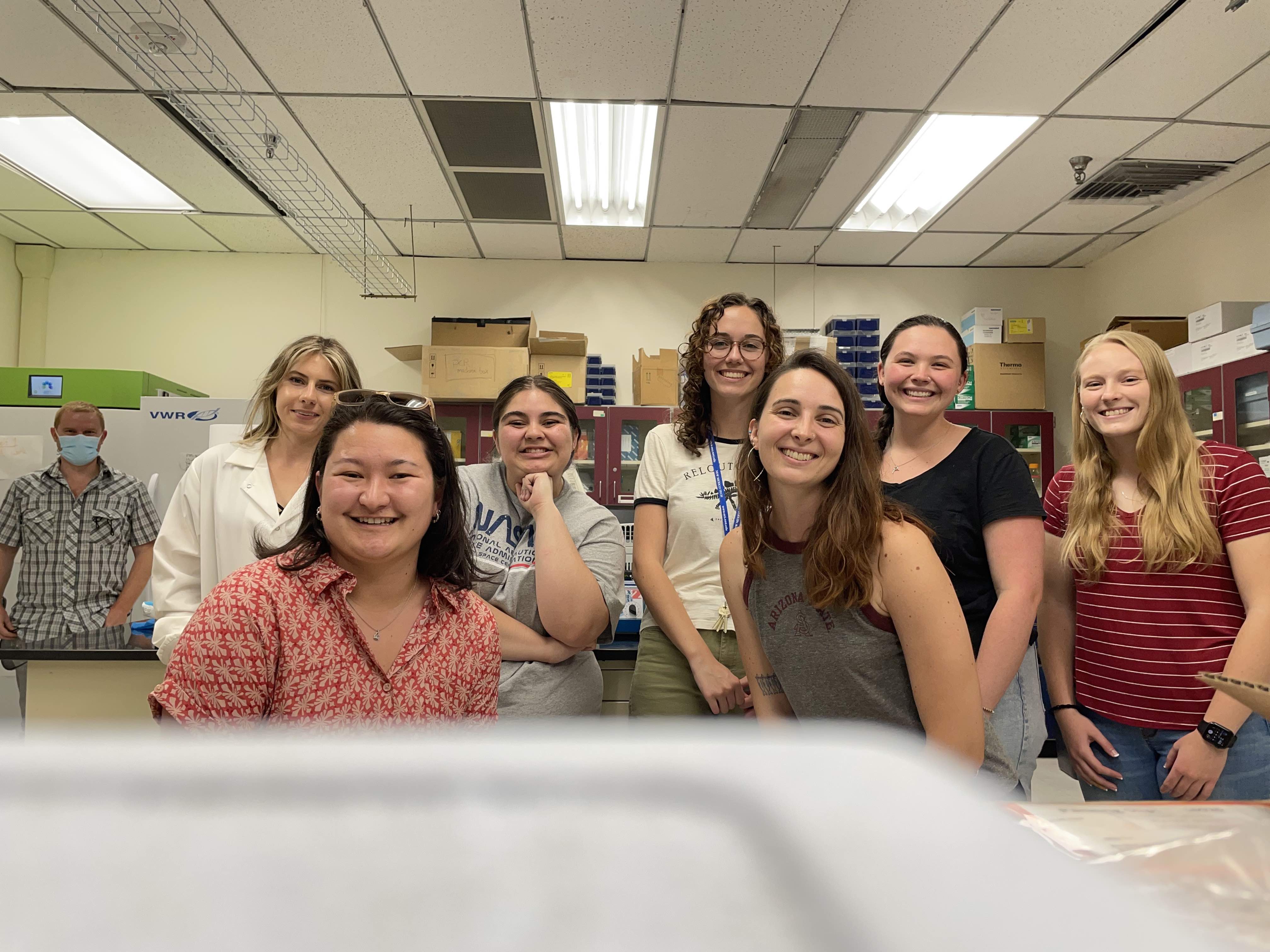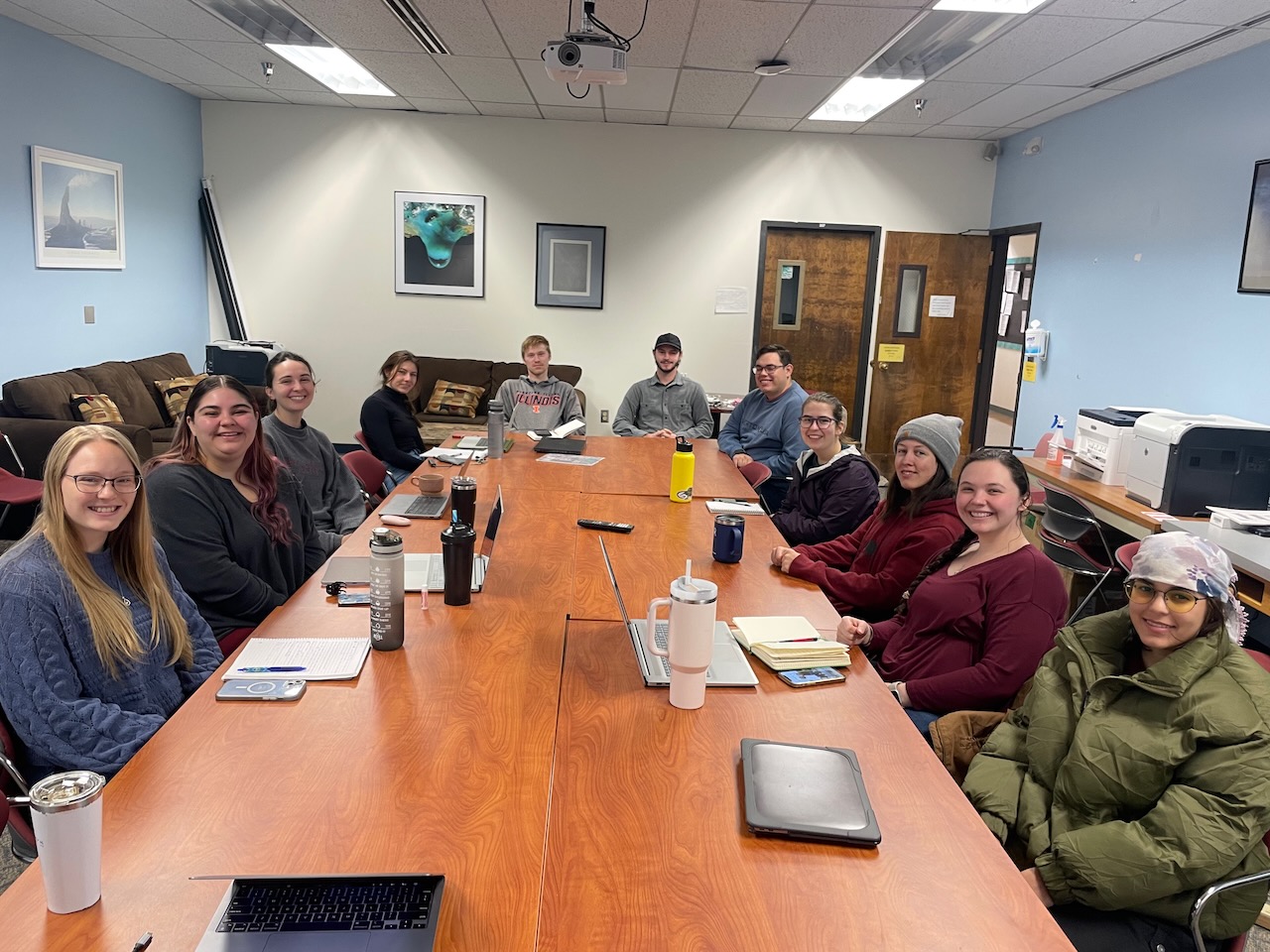Left to right, fall 2022: D. Jones, Zoë Havlena, Kathryn Hobart, Calyssa Huff, Katherine Krizek, Mackenzie Best, Abigail Brown, Katelyn Green. Left to right, spring 2024: Katelyn Green, Calyssa Huff, Mackenzie Best, Zoë Havlena, Joseph Hoberg, Jimmy Swift, Nathaniel Jobe (Kieft lab MSc student), Cassandra Skaar, Anika Baloun, Laura Rodriguez.

Daniel Jones, Ph.D.
Assistant Professor
Earth & Environmental Science
- daniel.s.jones@nmt.edu
- 575-835-5049
- MSEC 315
Assistant Professor of Geobiology, Earth & Environmental Science
Academic Director, National Cave and Karst Research Institute (NCKRI)
I am a geomicrobiologist and biogeochemist specializing in microbial sulfur cycling and microbe-mineral interactions in cave systems. In addition to my work on caves and karst, I have diverse research interests in the field of geomicrobiology, including microbial processes in mine waste, marine sediments, and wetland ecosystems.
Prior to my position at NMT and NCKRI, I served as the program coordinator for the bioremediation-focused MnDRIVE Environment initiative at the University of Minnesota, and was a research associate in the University of Minnesota BioTechnology Institute. I am also graduate faculty in the Department of Earth and Environmental Sciences at the University of Minnesota.
Below: Recent lab group photos (fall 2022 and spring 2024).


Links:
Dan's research website (currently updating)
The National Cave and Karst Research Institute (NCKRI)
Science communication class activity (sciworthy.com)
Courses:
Geomicrobiology (Fall 2022 syllabus)
Earth History (Spring 2024 syllabus)
Earth History for Masters of Science for Teachers (MST) (Spring 2023 syllabus)
Special Topics in Cave & Karst Processes (Spring 2020 syllabus)
Metagenomic Analysis (Spring 2023 syllabus)
Introduction to Cave Geology (Fall 2023 syllabus)
Environmental Microbiology (Spring 2024 syllabus)
Select recent publications:
Havlena ZE*, Hose LD, DuChene HR, Baker GM, Powell D, Labrado AL, Brunner B, Jones DS (in review at Geobiology). Origin and modern microbial ecology of secondary mineral deposits in Lehman Caves, Great Basin National Park, NV, USA. (Preprint available on bioRxiv, https://doi.org/10.1101/2023.08.15.553329)
Hobart KK*, Greensky Z**, Hernandez K**, Feinberg JM, Bailey JV, Jones DS (2023) Microbial communities from weathered outcrops of a sulfide-rich ultramafic intrusion, and implications for mine waste management. Environ Microbiol, 25(12), 3512–3526. https://doi.org/10.1111/1462-2920.16489
Jones DS, Schaperdoth I, Northup DE, Gómez-Cruz R, Macalady JL (2023), Convergent community assembly among globally separated acidic cave biofilms. Appl Environ Microbiol v.89, e01575-22. https://doi.org/10.1128/aem.01575-22
Jones DS, Northup DE (2021). Cave decorating with microbes: Geomicrobiology of caves. Elements 17(2). https://doi.org/10.2138/gselements.17.2.107
Hose LD, Duchene HR, Jones DS, Baker G, Havlena ZE*, Sweetkind D, Powell JD (2021) Hypogenic karst of the Great Basin, in Florsheim J, Koeberl C, Riggs N, and McKay MP, eds., GSA Section Meeting Guides: Geological Society of America Field Guide 61, p. 1–38. https://doi.org/10.1130/2020.0061(05)
Havlena ZE*, Kieft T, Veni G, Horrocks R, Jones DS (2021). Lighting effects on the development and diversity of photosynthetic biofilm communities in Carlsbad Cavern, New Mexico. Appl Environ Microbiol 87: e02695-20. https://doi.org/10.1128/AEM.02695-20
Jones DS, Johnson NW, Mitchell CP, Walker GM**, Bailey JV, Pastor J, Swain EB (2020). Diverse communities of hgcAB+microorganisms methylate mercury in freshwater sediments subjected to experimental sulfate loading. Environ Sci Tech, 54: 14265. https://doi.org/10.1021/acs.est.0c02513
Jones DS, Walker GM, Johnson NJ, Mitchell CPJ, Coleman Wasik JK, Bailey JV (2019). Molecular evidence for novel mercury methylating microorganisms in sulfate-impacted lakes. ISME J 13: 1659-1675 (https://doi.org/10.1038/s41396-019-0376-1)
Jones DS, Lapakko KA, Wenz ZJ, Olson MC, Roepke EW, Sadowsky MJ, Novak PJ, Bailey JV (2017). Novel microbial assemblages dominate weathered sulfide-bearing rock from copper-nickel deposits in the Duluth Complex, Minnesota, USA. Appl Environ Microbiol 83:e00909-17 (https://doi.org/10.1128/AEM.00909-17)
Galdenzi S and Jones DS, (2017). The Frasassi Caves: A “classical” active hypogenic cave. In Klimchouk A, Palmer A, Waele JD, Auler A, Audra P (ed), Hypogene Karst Regions and Caves of the World. Springer. (https://doi.org/10.1007/978-3-319-53348-3_8)
Jones DS, Schaperdoth I, Macalady JL (2016). Biogeography of sulfur-oxidizing Acidithiobacillus populations in extremely acidic cave biofilms. ISME J 10: 2879 (https://doi.org/10.1038/ismej.2016.74)
Jones DS, Flood BE, Bailey JV (2016). Metatranscriptomic insights into polyphosphate metabolism in marine sediments, ISME J 10: 1015 (DOI: https://doi.org/10.1038/ismej.2015.169)
Jones DS and Macalady, JL (2016). The snotty and the stringy: energy for subsurface life in caves. in Advances in Environmental Microbiology: Their World: a Diversity of Microbial Environments, ed. by C.J. Hurst, Springer DE, Heidelberg, Germany, p. 203-224 (https://doi.org/10.1007/978-3-319-28071-4_5)
Jones DS, Polerecky L, Dempsey BA, Galdenzi S, Macalady JL (2015). Fate of sulfide in the Frasassi cave system and implications for sulfuric acid speleogenesis, Chem Geol 410: 21 (https://doi.org/10.1016/j.chemgeo.2015.06.002)
Jones DS, Kohl K, Grettenberger C, Larson LL, Burgos WD, Macalady JL (2015). Geochemical niches of iron-oxidizing acidophiles in a coal mine discharge, Appl Environ Microbiol 81: 1242 (https://doi.org/10.1128/AEM.02919-14)
Jones DS, Flood BE, Bailey JV (2015). Metatranscriptomic analysis of diminutive Thiomargarita-like bacteria (Candidatus Thiopilula spp.) from abyssal cold seeps of the Barbados Accretionary Prism, Appl Environ Microbiol 81: 3142 (https://doi.org/10.1128/AEM.00039-15)
Zerkle AL, Jones DS, Farquhar J, Macalady JL (2015). Sulfur isotope values in the sulfidic Frasassi cave system, central Italy: A case study of a chemolithotrophic S-based ecosystem, Geochim Cosmochim Acta 173: 373 (https://doi.org/10.1016/j.gca.2015.10.028)